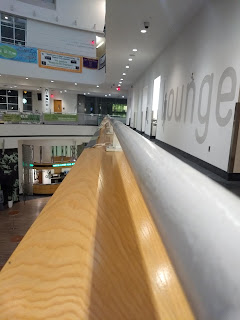(Originally published May 2020 for the Cleveland Stater student newspaper)
The graduating class of 2020, whether from high school
or college, has had nothing short of a tumultuous ride over the past few months
as they have had to face the physical and emotional challenges of completing
their education virtually due to stay-at-home orders across the country.
For many, having a full course load of online classes
was a first. For Cleveland State spring graduates, they are about to experience
yet another new undertaking – a virtual commencement ceremony.
Following the university’s announcement of its first
virtual commencement to be held on May 30 at 1p.m., graduates found themselves
with something to look forward to, since an in-person commencement had been
previously postponed until university officials are safely able to organize
one.
Cleveland State senior Katie Turocy will be finishing her
double major in psychology and health sciences on the pre-occupational therapy
track, and she said that while she wishes commencement could be held as normal,
she understands that a virtual ceremony is in the best interest for everyone.
“I am disappointed that the current circumstances led
to commencement being online. However, I think it is the best-case scenario,”
she said. “I would not want to risk my family, friends, or my own health by
having a ceremony. I think the online commencement could be put together really
well.”
Turocy plans to continue at Cleveland State for
graduate school, and said she feels blessed that she will at least be able to
experience another commencement ceremony down the line. As far as this year’s
ceremony goes, she said that if the school is able to organize an in-person
commencement exclusively for spring graduates she would certainly attend, but
if her class is combined with future fall graduates she would not feel
obligated.
For some, the validation of being able to eventually
walk the stage is still essential. Crystal Beaulieu, graduating from the
journalism program, said she is both excited and curious to see what the
virtual commencement has in store – but not quite sure what to expect. She has eagerly
anticipated the chance to ‘walk’ for a long time, not just for the thunderous
applause, but for the deep symbolism it holds for herself and her family.
“It's very important for me to walk the stage. As a
non-traditional college student and first-generation college graduate, it has taken
me over 15 years to earn my bachelor's degree. Now in my mid-30s, I realize the
importance of this accomplishment and the grit it took for me to actually
graduate,” she said. “My children have watched me struggle and work hard to
earn this, and they themselves have had to sacrifice time with their mom as I
worked through my courses. Walking the stage would give me the gratification of
all my hard work and would give my family the pride of knowing the support
they've given me was just what I needed.”
Justin Rosenbaum, 23, graduated from Cleveland State
last May under much more normal circumstances, however, he said thinks the idea
of a virtual ceremony is a commendable effort upon the part of the university to
still honor graduates during unprecedented circumstances.
“As far as pulling it off effectively, I think the
school can figure out an appropriate format for families to tune in and students
to feel some sort of closure with their graduation,” Rosenbaum said.
He said he wanted to encourage this year’s graduates
to focus on their achievements, despite how challenging the conditions around
them may be.
“I would tell them the important part is that they
were able to graduate. It could have been a situation that was so bad that they
couldn’t even finish school,” Rosenbaum said. “So as bad as it may sound in the
moment, the important thing is that they graduated and received their degree.”
































